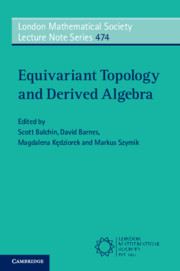Book contents
- Frontmatter
- Table of Contents
- List of Contributors
- Preface
- Frontispiece
- 1 Comparing Dualities in the K(n)-local Category
- 2 Axiomatic Representation Theory of Finite Groups by way of Groupoids
- 3 Chromatic Fracture Cubes
- 4 An Introduction to Algebraic Models for Rational G–Spectra
- 5 Monoidal Bousfield Localizations and Algebras over Operads
- 6 Stratification and Duality for Unipotent Finite Supergroup Schemes
- 7 Bi-incomplete Tambara Functors
- 8 Homotopy Limits of Model Categories, Revisited
4 - An Introduction to Algebraic Models for Rational G–Spectra
Published online by Cambridge University Press: 29 October 2021
- Frontmatter
- Table of Contents
- List of Contributors
- Preface
- Frontispiece
- 1 Comparing Dualities in the K(n)-local Category
- 2 Axiomatic Representation Theory of Finite Groups by way of Groupoids
- 3 Chromatic Fracture Cubes
- 4 An Introduction to Algebraic Models for Rational G–Spectra
- 5 Monoidal Bousfield Localizations and Algebras over Operads
- 6 Stratification and Duality for Unipotent Finite Supergroup Schemes
- 7 Bi-incomplete Tambara Functors
- 8 Homotopy Limits of Model Categories, Revisited
Summary
The project of Greenlees et al. on understanding rational G-spectra in terms of algebraic categories has had many successes, classifying rational G-spectra for finite groups, SO(2), O(2), SO(3), free and cofree G-spectra as well as rational toral G-spectra for arbitrary compact Lie groups. This chapter provides an introduction to the subject in two parts. The first discusses rational G-Mackey functors, the action of the Burnside ring and change of group functors. It gives a complete proof of the well-known classification of rational Mackey functors for finite G. The second part discusses the methods and tools from equivariant stable homotopy theory needed to obtain algebraic models for rational G-spectra. It gives a summary of the key steps in the classification of rational G-spectra in terms of a symmetric monoidal algebraic category. Having these two parts in the same place allows one to see clearly the analogy between the algebraic and topological classifications.
- Type
- Chapter
- Information
- Equivariant Topology and Derived Algebra , pp. 119 - 179Publisher: Cambridge University PressPrint publication year: 2021
- 1
- Cited by

